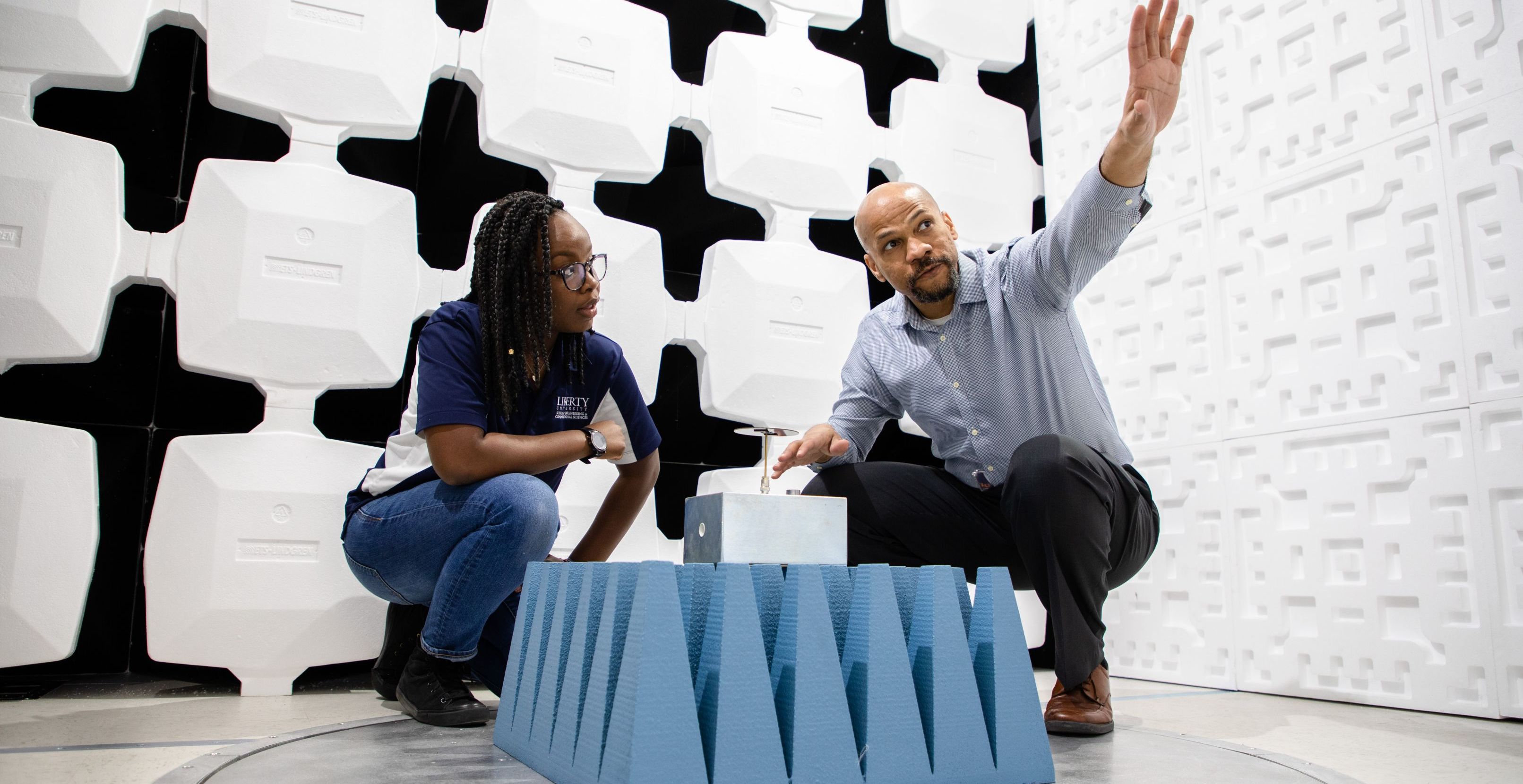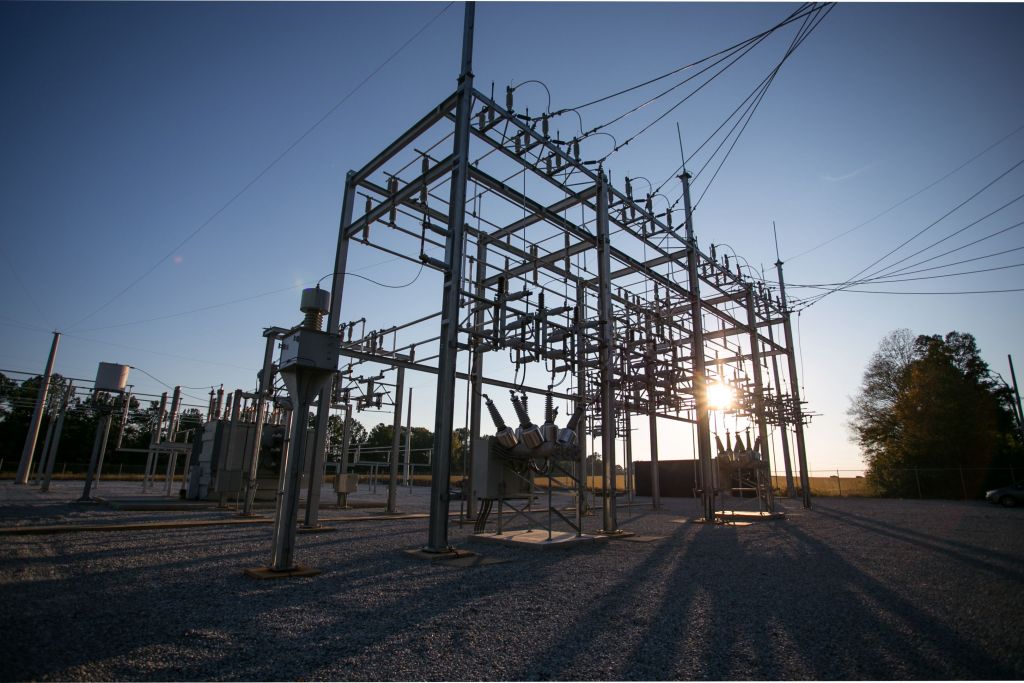
Bachelor of Science in Electrical Engineering
Design and Build New Products with an Electrical Engineering Degree
If you love the idea of making intricate electronic systems, working with robotics and biometrics, and building electronic devices, then our Bachelor of Science (BS) in Electrical Engineering can help you expand your knowledge on these interests. Electrical engineering applies the principles of electricity, magnetism, and light to design and build products that benefit people.
Dream of working with cutting-edge technology? With this degree, you could design the next big thing in electronics, work on space missions, or even develop life-saving medical devices. You can study how to tackle tricky challenges and find smart solutions. From designing robots to creating new ways to use electricity, you can study to be at the forefront of innovation.
Electrical engineers don’t just make cool stuff; they often solve real-world problems. You could help bring electricity to remote areas, develop renewable energy sources, or create technology that makes life better for people around the world. As an electrical engineer, you hold the power to change lives.
Your work could help communities by improving communication systems, providing sustainable energy solutions, or enhancing public safety with better electronic systems. The possibilities are endless!
Liberty University’s electrical engineering bachelor’s degree program provides an overview of the foundational principles of electrical engineering with a specific focus on the discipline areas of electromagnetic and electronic circuits. We aim to produce Christ-centered men and women who will go into the workforce with the values, skills, and knowledge essential to be a positive force in electrical engineering-related industries.
Credit Hours
View CoursesNext start date: Aug 18, 2025

ABET Accredited
Highlights
Highlights of Our Undergraduate Electrical Engineering Degree
Gain Hands-On Experience in Labs
Many classes are associated with a lab. This gives you an opportunity for practical application, problem solving, and better assimilation of the lessons.
Phenomenal Facilities and Faculty
You will have access to the latest technology and qualified faculty who seek to know you personally and to provide you with opportunities for further education, research, and training in a Christ-centered environment.
Seek Practical Skills in an Internship
You may have the opportunity to pursue an internship at a variety of Fortune 500 companies and government agencies. This can offer you the chance to develop valuable hands-on experience.
Career Potential
What Can You Do with an Undergraduate Electrical Engineering Degree?
Liberty University’s Bachelor of Science in Electrical Engineering can help prepare you to pursue the following occupations:
- Aerospace engineer
- Broadcast engineer
- Design engineer
- Electrical engineer
- Robotics engineer


#4 Best College Campus in America
At Liberty, you’ll find an affordable, high-quality education designed to help equip students like you for the real world. Our commitment to excellence has earned us recognition as the #4 Best College Campus in America by Niche.com.
Earning your degree from a nonprofit university with state-of-the-art resources like ours can help set you apart from your peers.
Courses
What Will You Study in Our Electrical Engineering Bachelor’s Degree Program?
In our BS in Electrical Engineering degree, you will study how to apply probability and statistics to electrical engineering. In addition, you can gain knowledge of scientific and mathematical principles necessary to analyze and design complex digital systems. This knowledge can be useful in understanding the creation of electronics and control systems.
You will also explore the basic architecture of computers, as this information and training can be instrumental in developing a broad understanding of all areas of engineering. From there, you will study the basics of electronic components and control systems. This program will also cover how to develop a plan, team dynamics, budgeting, creating a conceptual design, and other factors that are crucial in seeing a design through to completion.
As you move forward, get ready to roll up your sleeves in our state-of-the-art labs. Here, your learning leaps off the pages of textbooks. You’ll build circuits, experiment with electronic devices, and even start dabbling in robotics. These hands-on experiences are crucial – they’re about understanding how things work and learning how to think like an engineer.
As technology evolves, so will your learning. You’ll explore areas like telecommunications, network systems, and even the basics of machine learning and artificial intelligence. This is your chance to get a grip on the technologies that are shaping our world. You can begin to understand not just how these systems work but also how to innovate and improve them.
In this program, you don’t just have the opportunity to study; you can also discover, create, and innovate. It’s a journey that can help you prepare to be more than just an engineer – you can become a problem solver, creator, and future leader in the world of electrical engineering.
Featured Electrical Engineering Courses
ENGC 361 – Computer Architecture
ENGE 321 – Electronics
ENGE 411 – Control Systems
Degree Information
- This program falls under the School of Engineering
- View the Degree Completion Plan
- Check out our course catalog
- Transfer in up to 75% of the degree total
ABET Accreditation
The Electrical Engineering program is accredited by the Engineering Accreditation Commission(s) of ABET, https://www.abet.org, under the General Criteria and the Program Criteria for Electrical, Computer, Communications, Telecommunication(s), and Similarly Named Engineering Programs.*
*ABET accredits postsecondary degree-granting programs housed within regionally accredited institutions. They accredit programs only, not degrees, departments, colleges, or institutions.

BENEFITS
Why Choose Liberty’s Civil Engineering Bachelor’s Program?
Hands-On Learning in State-of-the-Art Facilities
At Liberty, you won’t just study electrical engineering – you’ll practice it in advanced laboratories equipped with cutting-edge technology. Our classrooms and lab spaces are designed to give you practical experience that reinforces what you learn in theory.
From electronics and circuits to robotics and energy systems, you’ll have access to tools that mirror real-world industry environments. These experiences help you develop the confidence to tackle complex engineering challenges both in and out of the classroom.
Internship Opportunities that Align with Your Goals
Your learning can extend beyond the classroom through internship opportunities with organizations that match your career interests. You can work alongside industry professionals who offer mentoring as you apply your technical skills in real-world situations.
Engineering students at Liberty have interned at many different companies across a variety of states and countries, demonstrating the breadth of opportunities available. These experiences can help you build your résumé and grow your professional network before graduation.
A Christian Community with a Purpose-Driven Focus
At Liberty, you can become part of a community that encourages you to integrate faith and purpose into the pursuit of your career. Our faculty are not only experienced engineers but also mentors who are committed to helping you develop ethically grounded decision-making.
Through your coursework, projects, and relationships, you can be challenged to think critically about how engineering can be used to serve others and make a positive impact. This values-driven approach can shape the way you approach your work long after graduation.
Collaborative Projects that Bring Ideas to Life
As a Liberty electrical engineering student, you’ll take part in team-based projects that challenge you to solve real-world problems. Whether you’re designing circuit systems, working with robotics, or innovating energy solutions, you have the opportunity to collaborate with peers to turn concepts into functioning models.
These projects mirror the kind of teamwork and problem-solving often found in the workplace. Along the way, you can gain practical experience that can deepen your understanding and help sharpen your creative thinking.
Admissions
How Do You Become a Electrical Engineering Bachelor’s Student?
Every application is reviewed by the admission committee on a case-by-case basis, meaning there are no set minimums for acceptance. However, all applicants must submit the following documents* for admission:
- Admission application
- Official high school transcripts
- Official college transcripts (if applicable)
- Admission essay
Results from the CLT, SAT, or ACT are not required for admission, but may be used in consideration for merit-based aid.
*Note that additional documentation may be requested by the admission committee after your application has been received.

Have Questions?
We’ll make sure you have the information you need to take your next step.